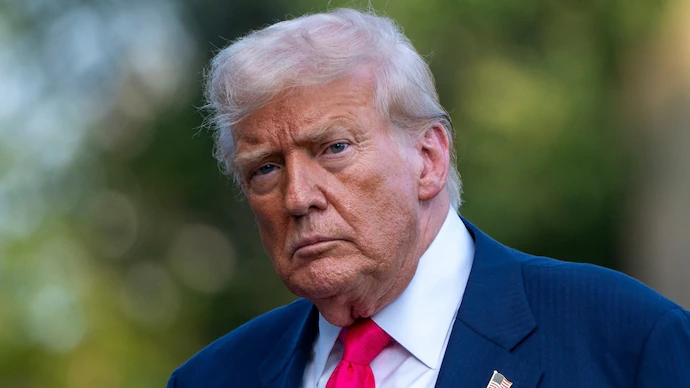Trump’s Gaza Comments — A Political Flashpoint Amid Escalating Middle East Tensions
In a sharp and provocative statement that instantly reverberated across the global diplomatic landscape, former U.S. President Donald Trump declared that Hamas “wants to die” and called upon Israel to “finish the job” in Gaza. This declaration, made in the midst of an already fragile and combustible regional situation, not only stirred intense reactions domestically but also added a layer of political complexity to the broader Middle East discourse.
Speaking during a campaign stop in Michigan on Friday night, Trump framed Hamas as an irredeemable force driven by a death wish, further suggesting that Israel has the moral imperative to decisively eliminate the group. “Hamas wants to die. They want to die. They’re sick,” Trump said to a crowd of supporters. “Israel’s got to finish the job. They’ve got to finish it. They’ve got to get it done. They’ve got to get it over with. And they’ve got to do it fast and they’ve got to do it tough.”
Trump’s comments, while not entirely surprising given his history of blunt rhetoric, mark a new chapter in his public commentary on the ongoing Israel-Hamas war. These statements come as the conflict in Gaza continues to claim thousands of lives and spark humanitarian crises that have drawn sharp international criticism.
Political Messaging or Foreign Policy Positioning?
For many analysts, Trump’s remarks carry weight far beyond campaign trail posturing. As the likely Republican nominee for the 2024 U.S. presidential election, his positions are being closely scrutinized for clues about how a potential second Trump administration might approach U.S. foreign policy, particularly in the Middle East.
Unlike President Joe Biden, who has maintained a diplomatic balancing act — supporting Israel’s right to defend itself while urging restraint to prevent mass civilian casualties — Trump has opted for unabashed, one-sided support for the Israeli military campaign. This signals a continuation of his earlier approach to the region, notably seen during his administration’s brokering of the Abraham Accords and the relocation of the U.S. Embassy to Jerusalem.
While such assertiveness plays well with segments of the conservative base, it raises concerns among human rights groups and foreign policy experts who warn that unqualified backing could embolden further escalation, civilian suffering, and the deepening of hostilities.
Israel’s ‘Job’: An Ambiguous Objective
Trump’s call for Israel to “finish the job” raises a critical question — what exactly constitutes the ‘job’ in Gaza? Is it the complete military annihilation of Hamas? The occupation and governance of Gaza by Israeli forces? Or the installation of a new Palestinian political structure? Israeli officials themselves have offered varying definitions since the conflict reignited, ranging from dismantling Hamas’ military infrastructure to completely eliminating its leadership.
Trump’s lack of specificity may have been intentional, appealing to a broad swath of voters who prioritize a strongman image over policy details. Yet such ambiguity also leaves space for dangerous misinterpretations on the ground — especially at a time when Gaza is teetering under relentless airstrikes, food insecurity, water shortages, and internal displacement.
According to humanitarian agencies, over 30,000 civilians have been killed or wounded in the months since the conflict escalated — a statistic that makes calls to “finish it fast” not only ethically fraught but diplomatically perilous.
Domestic Political Calculus
From a domestic political perspective, Trump’s remarks serve several functions. Firstly, they reaffirm his brand of unapologetic nationalism and muscular foreign policy. Secondly, they draw a contrast with Biden’s more measured, multilateral approach. Thirdly, they re-energize evangelical Christian and pro-Israel constituencies within the Republican base — voter groups that played a critical role in Trump’s 2016 and 2020 campaigns.
However, Trump’s position also risks alienating independent and younger voters, many of whom have grown increasingly critical of Israel’s handling of the conflict. A recent Gallup poll shows a significant drop in American sympathy toward Israel among Democrats and younger Americans, pointing to a growing generational divide on U.S. foreign policy in the Middle East.
If Trump’s goal is to galvanize his base while igniting the culture war flames, his comments have already succeeded. But if he’s aiming to build a broad coalition ahead of 2024, such incendiary rhetoric could backfire among undecided voters who are increasingly concerned about global humanitarian crises.
International Reactions Begin to Mount
Although immediate global reactions to Trump’s remarks were muted, diplomatic insiders suggest that governments around the world are closely monitoring the potential return of Trump-style diplomacy. European Union officials, for instance, have privately expressed alarm over any political language that could further destabilize the fragile ceasefire talks and humanitarian corridors being negotiated in Gaza.
Arab League nations, already vocal about the scale of destruction in Gaza, are likely to interpret Trump’s words as a green light for Israel to escalate its operations — an interpretation that could provoke new waves of anti-American sentiment in the region.
On the other hand, Israeli right-wing politicians and hardliners might welcome Trump’s return to the spotlight, especially if they feel the current Biden administration is softening under pressure from international bodies like the United Nations or the International Criminal Court.
The Ethics of War Rhetoric
It’s worth pausing to reflect on the ethical implications of a former U.S. president encouraging a military campaign with such finality. To say “Hamas wants to die” is to strip the conflict of its political and historical context — decades of occupation, failed peace processes, mutual acts of aggression, and shifting alliances.
Such rhetoric reduces a complex geopolitical crisis into a binary of good versus evil, just versus unjust — ignoring the civilian toll that comes with every airstrike, every blockade, every retaliatory rocket. It dehumanizes not only the enemy but also the countless civilians caught in the crossfire.
In war, words are weapons too. And when leaders speak casually of finishing the job without accountability or clarity, they risk writing scripts that others follow with bombs and bullets.
Donald Trump’s latest call for Israel to “finish the job” in Gaza isn’t emerging in a vacuum. It’s rooted in a clear and deliberate foreign policy framework that he began constructing during his first term in office. While many of his critics dismissed his approach as erratic and impulsive, Trump’s Middle East doctrine was, in fact, guided by a few consistent principles: aggressive deterrence, transactional diplomacy, and unconditional support for Israel.
As Trump attempts a political comeback ahead of the 2024 election, his public statements on Hamas and Gaza are reactivating that doctrine — both as campaign rhetoric and as a potential policy roadmap. To fully understand the significance of his recent remarks, one must revisit the hallmarks of his Middle East policy during his presidency and assess their lingering impact.
Jerusalem and the Embassy Shift: Redrawing the Diplomatic Map
One of the most controversial and symbolic decisions of Trump’s foreign policy was recognizing Jerusalem as the capital of Israel and relocating the U.S. Embassy from Tel Aviv in May 2018. This move, though celebrated by Israeli leaders and pro-Israel advocates, ignited outrage across the Arab world and triggered mass protests throughout the occupied Palestinian territories.
Critics saw the decision as a direct blow to the peace process, effectively disqualifying the U.S. from acting as a neutral mediator. For Palestinians, it was a clear message that their claims to East Jerusalem were being erased from diplomatic discourse. For Trump and his administration, it was framed as a long-overdue correction of reality.
Fast-forward to 2025, and Trump’s messaging — urging Israel to “finish the job” — is a continuation of that same unflinching alignment. While the Biden administration has attempted to walk a more balanced path, the lingering legacy of Trump’s embassy shift continues to define the contours of U.S.-Palestinian relations.
The Abraham Accords: A New Era or Strategic Sidestep?
Perhaps Trump’s most widely praised initiative in the region was the 2020 Abraham Accords, which normalized diplomatic relations between Israel and several Arab states, including the UAE, Bahrain, Morocco, and Sudan. Trump touted the agreements as groundbreaking achievements that ushered in a new era of Middle Eastern cooperation.
But what the Accords offered in symbolic diplomacy, they arguably lacked in substance regarding the core Israeli-Palestinian conflict. The normalization deals bypassed Palestine entirely, pushing their concerns further to the margins. For Trump, the Abraham Accords were a success not because they resolved the conflict but because they shifted the focus away from it — effectively recasting regional peace without Palestinian participation.
That reframing continues in his 2025 commentary. When Trump calls on Israel to act swiftly and “get it done,” he isn’t just advocating military force — he’s doubling down on a worldview that deprioritizes Palestinian statehood in favor of Israeli security and regional alignment.
Military Might and the Language of Power
Throughout his presidency, Trump favored language that emphasized dominance, deterrence, and finality. Whether it was the drone strike that killed Iranian General Qassem Soleimani or his threat to “totally destroy North Korea,” Trump has consistently used the language of overwhelming force.
This pattern continues in his rhetoric on Gaza. Phrases like “Hamas wants to die” are not merely hyperbolic — they reveal a worldview in which enemies are stripped of nuance and reduced to targets. It’s a vocabulary that plays well to audiences who crave clarity and retribution but fails to accommodate the complexities of asymmetric warfare, civilian casualties, or political negotiation.
While Israel’s leaders may appreciate the unwavering support, Trump’s words risk giving moral cover to actions that may cross international legal lines. In war, semantics matter — and encouragement to “finish the job” can be dangerously interpreted as a blank check.
How Trump’s Words Influence Israeli Strategy
Trump’s influence on Israeli policy has been more than symbolic. During his presidency, Israeli Prime Minister Benjamin Netanyahu grew increasingly emboldened in his domestic and foreign policy decisions. The lack of pushback from Washington gave the Israeli government space to expand settlements, delay negotiations, and take a more aggressive stance on security matters.
With Trump now back in the headlines, and with the 2024 election looming, Israeli politicians may once again be factoring his views into their long-term calculations. The potential return of a U.S. administration that will offer unconditional support could influence how Israel paces and frames its current Gaza campaign.
This dynamic becomes especially important as international condemnation of Israeli strikes grows louder. While Biden faces pressure to moderate Israeli action and respond to humanitarian concerns, Trump’s voice adds counterweight — reinforcing a narrative of necessity, inevitability, and even righteousness.
Domestic Fallout: The Electoral Battlefield
Domestically, Trump’s hardline stance is part of a broader electoral strategy. With evangelical Christian voters, pro-Israel lobby groups, and conservative hawks forming key pillars of his support base, his messaging is calculated, not careless.
However, Trump’s framing of Hamas as suicidal zealots and Israel as justified executioners may alienate crucial voter blocs — particularly Arab-American communities in Michigan, a swing state where his remarks were delivered. Many within these communities view the Gaza conflict through a deeply personal and humanitarian lens, and Trump’s rhetoric may be perceived as callous or inflammatory.
Moreover, younger voters across the political spectrum — more globally connected and less deferential to traditional foreign policy postures — are likely to see such statements as oversimplifications of a deeply complex issue. Their growing influence on national discourse means that overly militant framing may no longer carry the same universal appeal.
Global Stakes: A Region on the Brink
The Israel-Hamas conflict is not just a bilateral crisis; it’s a geopolitical tinderbox with consequences stretching from Tehran to Washington, from Ankara to Moscow. Trump’s commentary, though delivered at a campaign rally, will not go unnoticed by actors across the region.
Iran, a staunch Hamas supporter, may interpret Trump’s stance as indicative of long-term U.S. hostility toward the Palestinian cause — potentially escalating its own support for militant proxies. Turkey and Qatar, who have attempted to position themselves as negotiators, may find their roles further complicated by American political polarization.
Meanwhile, the European Union and the United Nations — already frustrated with Washington’s divided posture — may struggle to coordinate effective diplomatic responses when faced with contradictory signals from American leaders.
Donald Trump’s declaration that “Hamas wants to die” and that Israel must “finish the job” is more than just a campaign soundbite—it’s a powerful piece of war rhetoric that can echo far beyond American political rallies. In an era where global conflicts are not only fought on battlefields but also shaped by narratives and public sentiment, such statements can dramatically influence perceptions, decisions, and consequences.
In this section, we explore the far-reaching impact of war rhetoric, especially when voiced by a former—and potentially future—president of the United States. We also delve into the humanitarian realities of the Gaza conflict and contrast them with the simplicity of Trump’s polarizing framing.
The Historical Impact of Presidential Rhetoric in War
History has shown that American presidential rhetoric—whether official or informal—can directly affect the pace and shape of global conflicts. John F. Kennedy’s speeches during the Cuban Missile Crisis, George W. Bush’s “Axis of Evil” branding after 9/11, and Barack Obama’s cautious approach to Syrian red lines have all had measurable consequences in international diplomacy and military escalation.
Trump’s comments on Gaza follow this pattern, but with a modern twist: his communication happens not just through formal addresses, but often in rallies, social media, and interviews. The informality doesn’t reduce its impact—instead, it often increases it, particularly in an era where viral clips and headlines reach millions before governments issue formal responses.
In this context, the phrase “finish the job” sounds less like policy guidance and more like a battle cry. To hardliners within Israel, it may signal encouragement. To Palestinians, it may sound like a call for extermination. And to neutral observers, it could represent a retreat from diplomacy into total war.
The Dangerous Simplicity of “Good vs. Evil” Narratives
One of the most concerning aspects of Trump’s language is its reliance on moral binaries: Israel as the just, righteous actor and Hamas as an evil force that “wants to die.” While such framing may feel emotionally satisfying to some audiences, it dangerously oversimplifies a decades-long conflict deeply rooted in history, land disputes, failed negotiations, and generational trauma on both sides.
In truth, Hamas is both a political and militant entity, operating within a civilian population in Gaza. While their methods have included terror attacks and rocket strikes, they also represent a segment of Palestinian society—one shaped by occupation, blockade, and political marginalization. Painting them as suicidal maniacs not only flattens the reality but erases the suffering of innocent Palestinians caught in the middle.
This kind of rhetoric creates an environment where collateral damage is downplayed, where civilian deaths are considered inevitable or even deserved, and where the push for ceasefires or humanitarian aid is sidelined as weakness or betrayal.
Gaza: The Human Toll Behind the Headlines
As of the latest international reports, Gaza has endured relentless bombardment for months. Entire neighborhoods have been reduced to rubble, hospitals have collapsed under pressure, water infrastructure has failed, and access to food and medicine is severely restricted. The United Nations has repeatedly warned of a humanitarian catastrophe, with over 2 million people facing potential famine conditions.
Among the dead are thousands of children. Survivors face unimaginable psychological trauma. Schools have become shelters, and mosques have turned into makeshift morgues. The Gaza Strip—just 365 square kilometers in size—is being squeezed from every direction.
To call for Israel to “get it done fast and tough” in such a context appears devoid of empathy. While Israel cites security needs and self-defense, the international community, including many traditional allies, is increasingly calling for proportionality, restraint, and a renewed peace process. Trump’s framing ignores this humanitarian urgency entirely.
The Rise of Reactionary Foreign Policy
Trump’s foreign policy rhetoric, particularly on the Middle East, signals a return to reactionary leadership. It’s a style marked not by deliberation, multilateralism, or diplomacy—but by gut instinct, loyalty to allies regardless of conduct, and the embrace of maximum pressure.
This style found expression during his first term: in the withdrawal from the Iran nuclear deal, the assassination of General Soleimani, the carte blanche support for Netanyahu, and the dismissal of Palestinian grievances. Now, as Trump reasserts his presence on the political stage, these themes are resurfacing with familiar intensity.
His statements about Hamas are not isolated—they’re part of a broader worldview that sees compromise as weakness, nuance as indecision, and peace as a secondary objective. In a region already teetering on the edge of broader conflict—where Lebanon, Iran, Egypt, and Jordan are all watching with concern—such rhetoric carries tremendous risk.
Global Reactions to Trump’s Gaza Comments
While official responses to Trump’s remarks have been measured, international analysts and diplomats are watching closely. The fear is not that his words will cause immediate policy changes but that they will harden positions on all sides.
In Israel, hardline politicians may see Trump’s support as political cover for prolonged operations. In Gaza, groups like Hamas and Islamic Jihad may use his statements to rally support and further vilify the West. In the broader Arab world, already angry over civilian casualties, Trump’s language may be interpreted as evidence of long-standing Western bias.
In Europe, where leaders are trying to maintain humanitarian corridors and diplomatic pressure on both sides, Trump’s rhetoric complicates their efforts. And in Washington, even among Republicans, there’s debate about whether such language is appropriate or strategically wise.
Media, Social Platforms, and the Amplification of Extremes
Another layer to this narrative is the role of media. Trump’s comments, once made, are clipped, shared, retweeted, and repackaged in ways that intensify their tone and spread their impact. News outlets seeking ratings often feature the most inflammatory lines. Social media algorithms prioritize outrage. And supporters, detractors, and foreign governments alike weaponize these words to serve their own agendas.
In this environment, Trump’s call to “finish the job” doesn’t remain a statement—it becomes a meme, a chant, a justification, and in some cases, a recruitment tool. The amplification of extremist rhetoric is one of the defining dangers of the digital age—and in wartime, its consequences can be fatal.
Also Read : Thailand Imposes Martial Law in 8 Border Districts Near Cambodia After Deadly Clashes








